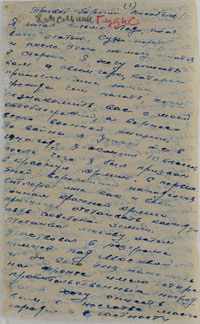Vladimir Gudis was born in Khmelnik, Vinnitsa Province, Ukraine in 1922. After graduating from high school, he was drafted into the Red Army in 1940. From the first days of the Soviet-German war he took part in combat. In the fall of 1941 he fought near Moscow and later in the battle of Stalingrad. By the fall of 1944 Gudis had been awarded four combat honors, including the Medal for Combat Merit and the Order of the Red Star.
Letter from Vladimir Gudis to Ilya Ehrenburg
In October 1944 the Soviet press published a letter from a certain Lady Gibbs that called for mercy toward and forgiveness of the Germans. The letter was published inKrasnaia zvezda alongside "Response to Lady Gibbs" by Ilya Ehrenburg. These publications raised a storm among the Soviet public. Ehrenburg received hundreds of letters from soldiers and officers of the Red Army, including one from Vladimir Gudis. This letter, which opposed the forgiving attitude of Lady Gibbs, depicted the barbarity of the Germans occupiers in Gudis' hometown:
"…my father managed to survive. He believed that my mother was still alive, but it turned out that she had been murdered in her own home in the most brutal way: her legs, ears, and arms were cut off.
That is the fate of my parents, not to mention the fate of my other relatives – my uncle and aunt and their children, who are no longer among the living….
When the Germans learned how close the Red Army was, they carried out mass shootings. My father's life was saved when he was liberated by the Red Army. He suffered greatly from a wound inflicted on his head with a whip and both of his legs had been broken. I wonder what Lady Gibbs would have said had she seen that!
Dear writer [Ilya Ehrenburg], if it is possible, write about this in the newspaper. Please answer me and I will describe more to you…."
From: Mordechai Altshuler, Yitzhak Arad, and Shmuel Krakowski, eds., Sovetskie evrei pishut Il'e Erenburgu(Soviet Jews Write to Ilya Ehrenburg), Jerusalem, 1993, p. 168.







